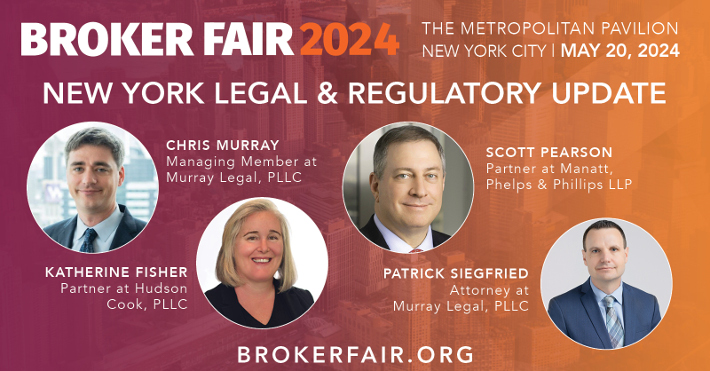Articles by deBanked Staff
The Status of the Legal Situation in New York
April 8, 2024| A lot has transpired on the legal front in New York State over the last month. If you’re a broker, funder, or lender that does business in New York, you cannot afford to miss this session at Broker Fair on May 20 in NYC. Come and learn about the current status and future outlook of the industry from this panel of knowledgeable attorneys. Your success is dependent on being informed. Take advantage of this opportunity!
|
Peter Ribeiro to Speak at Broker Fair 2024
April 8, 2024Brokers, get ready to learn from one of the industry masters. Peter Ribeiro, well known for his ability to build and scale a very successful broker shop, will be speaking at Broker Fair 2024 on May 20 in NYC. If you’ve ever wanted to hear how it’s done from him in person, this is your chance to do it!
Ribeiro also announced just last week that he has become CEO of Capital Gurus.
Revisiting Splits and Payment Methods in the Funding World
March 31, 2024 As most people are aware, ACH debits are only one method used in the small business finance industry to facilitate performance of a deal. Here are some other common ways:
As most people are aware, ACH debits are only one method used in the small business finance industry to facilitate performance of a deal. Here are some other common ways:
Split Funding
This method has been in use since at least 1998 and is still used by many funding companies today.
See: CC Splits Still Make Profits, Payments Knowledgeable Funders Benefit
Lockbox
A lockbox gives you the protection and visibility of a split but may require additional setup steps. This method was very common in the 2008 – 2012 era and is still available.
Variable ACH
The variable ACH system, made famous by MCC starting circa 2009, is still in use around the industry.
See: Homegrown Software Enables FundKite to Reconcile MCAs Daily Rather Than Monthly
Business Loans Up, But Environment Not Great
March 29, 2024 Survey results revealed by the Federal Reserve show some positive figures but a mixed backdrop. While small business commercial and industry (C&I) loans increased by 9.3% over the previous quarter, overall credit quality of applicants continued to decline as did loan demand. Approval rates also dipped at large and mid-sized banks down to 49% and 66% respectively.
Survey results revealed by the Federal Reserve show some positive figures but a mixed backdrop. While small business commercial and industry (C&I) loans increased by 9.3% over the previous quarter, overall credit quality of applicants continued to decline as did loan demand. Approval rates also dipped at large and mid-sized banks down to 49% and 66% respectively.
However, the startling statistic comes from small banks which experienced an increase in approval rate up to 89%! (Hard to believe?)
Credit line usage also went up for the third quarter in a row, of which 89% of these lines carried a variable rate.
“On net, respondents indicated that all loan terms tightened,” the report concluded. “About 85 percent of respondents cited less favorable or more uncertain economic outlook as a somewhat important or very important reason for the tightening. Other commonly cited reasons were worsening of industry-specific problems and reduced tolerance for risk.”
Controversial Search Engine Marketing Tactic Targeted by Google
March 24, 2024 When company domain names expire, some investors snatch them up to take advantage of the residual benefits left behind. That is that if the company had a significant footprint in search engines before going out of business then it can pay big money to bring that domain name back to life and monetize its organic search traffic.
When company domain names expire, some investors snatch them up to take advantage of the residual benefits left behind. That is that if the company had a significant footprint in search engines before going out of business then it can pay big money to bring that domain name back to life and monetize its organic search traffic.
But Google hasn’t become too fond of this strategy since it’s apparently often used in a deceptive manner.
“Expired domain abuse is where an expired domain name is purchased and repurposed primarily to manipulate search rankings by hosting content that provides little to no value to users,” wrote Google as part of its new policy. “Expired domain abuse isn’t something people accidentally do. It’s a practice employed by people who hope to rank well in Search with low-value content by using the past reputation of a domain name. These domains are generally not intended for visitors to find them in any other way but through search engines. It’s fine to use an old domain name for a new, original site that’s designed to serve people first.”
Google also made changes to its core algorithm that is reducing “unhelpful, low-quality, unoriginal content in its search results by 40%.”
Once upon a time Google organic search traffic could be make or break for a company but today there are so many platforms that people are using (Think the Amazon Echo, ChatGPT, TikTok, and more) that it is merely one channel out of many on the internet to acquire customers.
New York State Bill Aims to Recharacterize Factoring, Leasing, Revenue Based Financing, and More
March 22, 2024 A proposal to amend a New York State statute that governs how the rate of interest is computed “upon a loan or forbearance of any money, goods, or thing in action” seeks to broaden its application to an all encompassing umbrella of loan and non-loan products defined as a “financing arrangement” and then subject them all to usury caps.
A proposal to amend a New York State statute that governs how the rate of interest is computed “upon a loan or forbearance of any money, goods, or thing in action” seeks to broaden its application to an all encompassing umbrella of loan and non-loan products defined as a “financing arrangement” and then subject them all to usury caps.
And yes, it applies to commercial financing.
According to Assembly Bill 9585, a financing arrangement will be defined as “to include loans, forbearance of any money, goods or things in action, and all other transactions that involve the lending or advancing of money, goods or things in action for an amount charged, taken or received, and all transactions that operate as substitutes for such products, including but not limited to retail installment contracts, merchant cash advances, invoice financing, revenue-based financing, earned wage access or similar wage advance transactions, lease- or rent-to-own arrangements, rental-purchase agreements as defined in subdivision six of section five hundred of the personal property law, buy-now pay-later transactions, financing for litigation or legal settlements, income-sharing agreements and financing for education.”
And once that rate of interest is computed, “any rate exceeding twenty-five per centum per annum” in accordance with how the rate is allowed to be calculated, will be considered a Class E Felony of Criminal Usury.
This is just a bill. It hasn’t passed anything yet. It can be read here. It was introduced by Assemblywoman Helene E. Weinstein.
Bill Introduced to Try and Block SBA’s Plans to Become a Direct Lender
March 21, 2024 In case you missed it, the White House has called for the SBA to get into the direct lending business to “address gaps in access to small dollar lending.” The SBA has previously defined “small dollar lending” as loans under $150,000. Now the Biden administration wants it to compete in this segment against the private sector.
In case you missed it, the White House has called for the SBA to get into the direct lending business to “address gaps in access to small dollar lending.” The SBA has previously defined “small dollar lending” as loans under $150,000. Now the Biden administration wants it to compete in this segment against the private sector.
But a new bill introduced by two republican senators, called the Protecting Access to Credit for Small Businesses Act, says not so fast.
It literally says that its purpose is to “To prohibit the Administrator of the Small Business Administration from directly making loans under the 7(a) loan program, and for other purposes.”
“Fraud and inefficiency characterize the Small Business Administration’s history in direct lending,” said Senator John Kennedy in a statement. “The government shouldn’t crowd out private lenders that are already doing a good job getting funds to the small businesses that need them. I’m proud to partner with Sen. [Tim] Scott to stop the SBA from replacing private lenders and those in our communities with Washington bureaucrats.”
“When acting as a direct lender, the SBA has a consistent history of failure and inefficiency when compared to the private sector,” said Senator Scott. “The administration’s proposal is just a vehicle for a big government overreach into nearly all aspects of American life and private institutions. There’s simply no reason to use the federal government to funnel tax dollars that will later be loaned back to small businesses.”
Government agencies at all levels seem to be creeping into the small business lending game. Not only has the SBA recently upgraded its Lender Match online loan marketplace but the City of New York also recently launched its own business loan marketplace.
NYC Promotes its Own Online Business Loan Marketplace
March 17, 2024 There was so much demand for NYC’s experimental Small Business Opportunity Fund last year that it had to stop accepting applications after just 3 weeks. The program, however, ultimately enabled 1,046 businesses to collectively borrow $85 million at a low interest rate of only 4%. While the Mayor’s office has declared it a major success it is now encouraging anyone else seeking funds to use its relatively new online business loan marketplace called NYC Funds Finder.
There was so much demand for NYC’s experimental Small Business Opportunity Fund last year that it had to stop accepting applications after just 3 weeks. The program, however, ultimately enabled 1,046 businesses to collectively borrow $85 million at a low interest rate of only 4%. While the Mayor’s office has declared it a major success it is now encouraging anyone else seeking funds to use its relatively new online business loan marketplace called NYC Funds Finder.
Facilitated by Next Street, a b2b platform whose co-CEO Michael Roth is a former interim chief of the SBA, NYC Funds Finder promises to connect business owners with capital products that are “non-predatory and have been screened to ensure fair and transparent pricing and terms.”
An example of some of the lenders on the platform include Lendistry, Accompany Capital, and SmartBiz. APRs tend to range roughly from 7% to 19%.
“NYC Funds Finder serves New York City’s small businesses by aggregating funding options from many of [the NYC Department of] Small Business Services (SBS) and Next Street’s trusted partners,” said an official announcement that went out in September. “Additionally, the platform makes it easy for the business owner to connect with a free advisor if they need help navigating or applying for capital. This partnership with trusted SBS advisors is key for small businesses to access the best financing options for their business.”
Coincidentally, the SBA has also been pushing its own online business loan marketplace as of late. The SBA’s Lender Match tool has 1,000 SBA lenders and 257 community based lenders on its platform already.
































